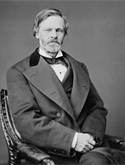Damaging Effects of the Sherman Antitrust Act
In 1890, the Sherman Antitrust Act became the first federal law to prevent “monopolistic,” “anticompetitive,” or “predatory” business practices. Sponsored by Republican Senator John Sherman of Ohio, the law was hailed as a great milestone. But its vague language failed to define what was a “monopolistic,” “anticompetitive,” or “predatory” business practice. Even worse, the law’s supposed purpose to curb big business only diverted attention from what politicians had sought all along: a high protective tariff to stifle foreign competition, which would help big business at the consumers’ expense.

Senator John Sherman
The Era of Trusts
Historians often call the late 19th century the “Gilded Age” or the “Age of the Robber Barons” based on the assumption that greedy capitalists sought to dominate emerging industries while further impoverishing the poor. However, the truth is that industries such as steel, railroads, and oil became enormous in this era because modern mass production techniques were being employed for the first time to provide basic needs and modern conveniences to more people than ever before. This created millions of jobs, which strengthened the economy and helped produce the strong middle class that became America’s backbone in the 20th century.
In their constant effort to improve efficiency, business leaders began banding together in the form of trusts. When lesser competitors failed to adopt more efficient business practices to better compete, they accused the trusts of forming monopolies and lobbied the government to stop them from being so successful. Employing class warfare, they complained that trusts were getting richer at the people’s expense, and their wealth needed to be either curtailed or confiscated. The public agreed, and politicians began exploring possible ways to regulate these trusts.
Were the Trusts Illegal Monopolies?
One of the most prevalent charges against the trusts was that they formed illegal monopolies, under which they raised prices to gain windfall profits. A “monopoly” is exclusive control of a commodity or service in a particular market, or a control that enables the manipulation of prices. So for a trust to be a “monopoly,” it had to have complete control over its products so it could decrease supply (through reduced production) to increase demand, which would force prices to rise.
However, in the decade before the Sherman Antitrust Act was passed, the industries accused of being “monopolies” grew seven times faster than the national economic growth rate. At the same time, prices charged by “monopolies” fell faster than national average price levels. For example, the Standard Oil Trust controlled about 90 percent of U.S. oil production, but oil prices were steadily falling as the trust continuously sought to improve efficiency. Why bother improving efficiency if a market is already cornered? From an economic standpoint, the trusts were not the monopolies that politicians, newspapers, and rival business leaders claimed.
Moreover, evidence suggests that even though members of Congress knew that trusts benefited consumers by expanding production, lowering prices, and creating jobs, they were concerned that the trusts were driving less efficient, higher-priced competitors out of the market. This concern came from lobbyists who pushed to protect bad business leaders. These leaders, instead of improving their businesses to better compete, lobbied Congress to pass laws weakening their stronger rivals.
Protecting “Protectionism”
John Sherman called his law the “Magna Carta of free enterprise.” But while Sherman and other politicians patted each other on the back for passing this law, the New York Times saw it for what it truly was: “That so-called Anti-Trust law was passed to deceive the people and to clear the way for the enactment of this… law relating to the tariff. It was projected in order that the party organs might say to the opponents of tariff extortion and protected combinations, ‘Behold! We have attacked the Trusts. The Republican party is the enemy of all such rings.’”
Sherman and most of his fellow Republicans were strong supporters of high tariffs (i.e., taxes) on imported goods. These taxes were intended to make domestic goods cheaper, thus diminishing competition. It was no coincidence that the Sherman Act was passed the same year as the McKinley Tariff Act, which imposed extremely high tariffs. So while the politicians seemed to be working for the people by supporting the Sherman Act, they were simultaneously raising tariffs to help big business diminish consumer choice.
The Times correctly argued that the antitrust law merely diverted attention from the real source of monopoly power: the protectionist tariff. Sherman himself declared that he supported the antitrust law because trusts “subverted the tariff system,” not because they harmed consumers. Thus the act, which was publicly touted as a tool to protect the people, was really just camouflage for raising tariffs. This ensured that special interests, political chicanery, and crony capitalism would override free enterprise.
A Big Business Win and a Consumer Defeat
Even before the Sherman Act was passed, many trusts began reorganizing into holding companies that were chartered by state legislatures. Others formed vertical combinations, in which corporations took control of every aspect of their industry. For example, Standard Oil controlled not only oil refining but railroads and ships to transport the oil, warehouses to store the oil, and raw materials to case the oil. Similarly, meatpacker Gustavus Swift owned his own cattle ranches, transportation networks, slaughterhouses, refrigerated railroad cars, and wholesale distributors. This type of top-to-bottom control reduced costs, increased profits, and created more jobs.
Ironically, the Sherman Act was invoked for the first time not against big business but against a labor union (the American Railway Union in 1894). The act was not regularly invoked until the presidencies of Theodore Roosevelt and William Howard Taft (1901-1913). In that time, several trusts were dissolved for alleged monopolistic practices, including Standard Oil in 1911.
The Sherman Antitrust Act produced two significant unintended consequences. One was that it pushed weak companies out of trusts and into either holding companies or vertical combinations. This actually strengthened business organization and made big business more powerful than ever before. Another important consequence was that instead of protecting consumers from monopoly, it protected less efficient businesses from superior competitors, which ultimately weakened the free market and harmed consumers. Both demonstrate the negative effects of political intervention in free enterprise, which continues to this day.





